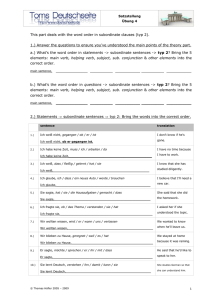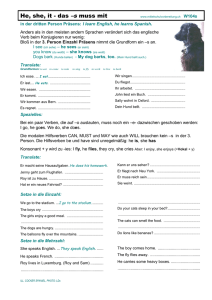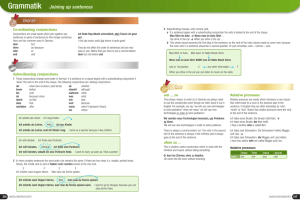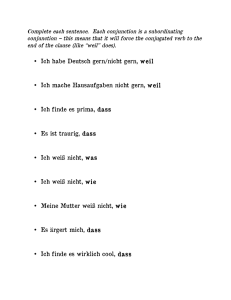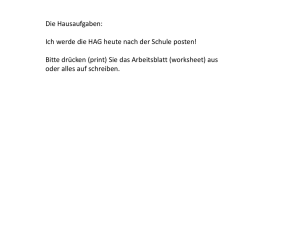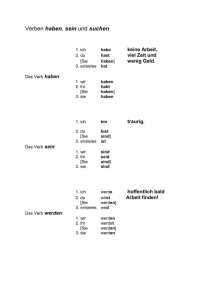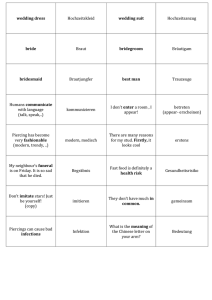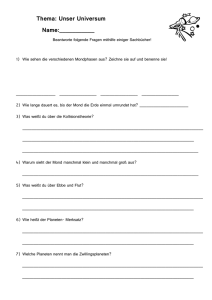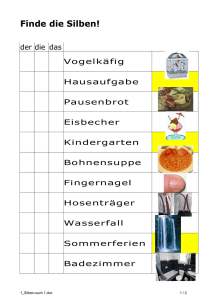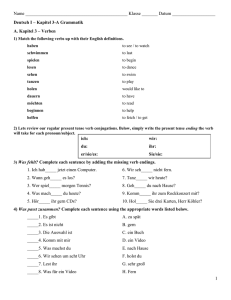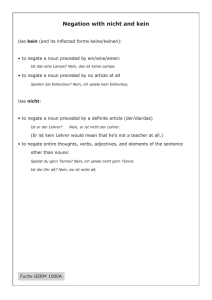Lösung - Toms Deutschseite
Werbung
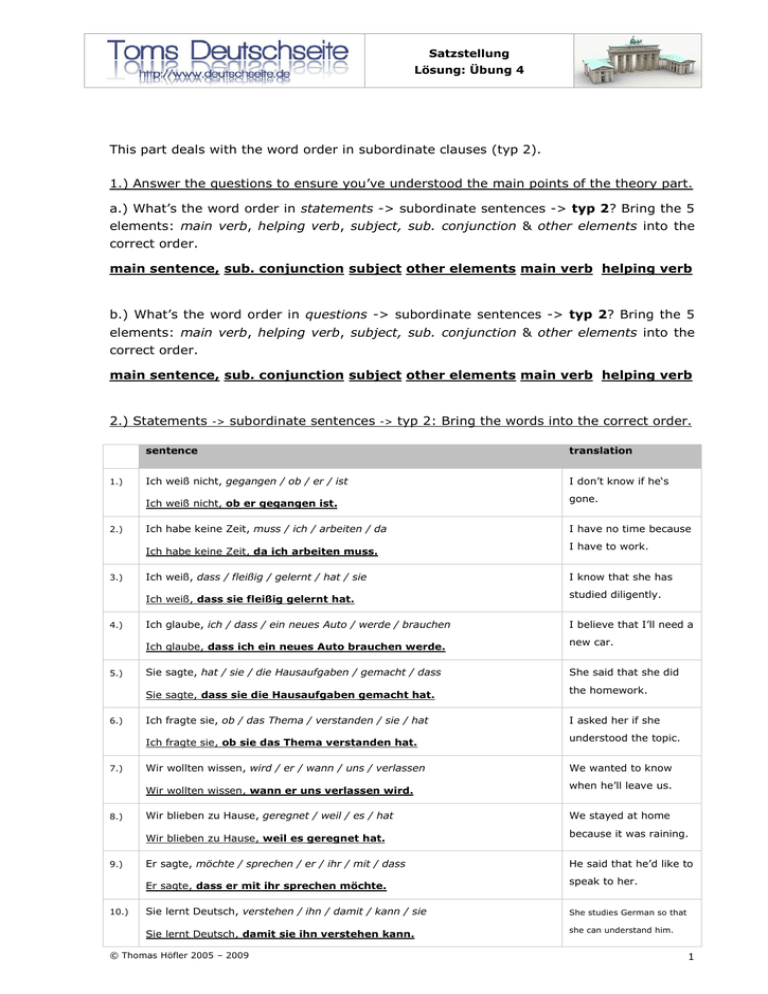
Satzstellung Lösung: Übung 4 This part deals with the word order in subordinate clauses (typ 2). 1.) Answer the questions to ensure you‟ve understood the main points of the theory part. a.) What‟s the word order in statements -> subordinate sentences -> typ 2? Bring the 5 elements: main verb, helping verb, subject, sub. conjunction & other elements into the correct order. main sentence, sub. conjunction subject other elements main verb helping verb b.) What‟s the word order in questions -> subordinate sentences -> typ 2? Bring the 5 elements: main verb, helping verb, subject, sub. conjunction & other elements into the correct order. main sentence, sub. conjunction subject other elements main verb helping verb 2.) Statements -> subordinate sentences -> typ 2: Bring the words into the correct order. 1.) 2.) 3.) 4.) 5.) 6.) 7.) 8.) 9.) 10.) sentence translation Ich weiß nicht, gegangen / ob / er / ist I don‟t know if he„s Ich weiß nicht, ob er gegangen ist. gone. Ich habe keine Zeit, muss / ich / arbeiten / da I have no time because Ich habe keine Zeit, da ich arbeiten muss. I have to work. Ich weiß, dass / fleißig / gelernt / hat / sie I know that she has Ich weiß, dass sie fleißig gelernt hat. studied diligently. Ich glaube, ich / dass / ein neues Auto / werde / brauchen I believe that I‟ll need a Ich glaube, dass ich ein neues Auto brauchen werde. new car. Sie sagte, hat / sie / die Hausaufgaben / gemacht / dass She said that she did Sie sagte, dass sie die Hausaufgaben gemacht hat. the homework. Ich fragte sie, ob / das Thema / verstanden / sie / hat I asked her if she Ich fragte sie, ob sie das Thema verstanden hat. understood the topic. Wir wollten wissen, wird / er / wann / uns / verlassen We wanted to know Wir wollten wissen, wann er uns verlassen wird. when he‟ll leave us. Wir blieben zu Hause, geregnet / weil / es / hat We stayed at home Wir blieben zu Hause, weil es geregnet hat. because it was raining. Er sagte, möchte / sprechen / er / ihr / mit / dass He said that he‟d like to Er sagte, dass er mit ihr sprechen möchte. speak to her. Sie lernt Deutsch, verstehen / ihn / damit / kann / sie She studies German so that Sie lernt Deutsch, damit sie ihn verstehen kann. she can understand him. © Thomas Höfler 2005 – 2009 1 Satzstellung Lösung: Übung 4 3.) Statements -> subordinate sentences -> typ 2: Join together two sentences using the sub. conjunction. Don‟t forget that you have to change the word order in the subordinate sentence = second sentence (same rules as in the exercises above). 1.) sentence translation Sie fragt. Du wirst zu Hause bleiben. (ob) She asked if you will stay at home. Sie fragte, ob du zu Hause bleiben wirst. 2.) Ich kann nicht kommen. Ich muss lernen. (weil) I can‟t come because I have to study. Ich kann nicht kommen, weil ich lernen muss. 3.) Joy sagte. Sie sind nach Manila geflogen. (dass) Joy said that they flew to Manila. Joy sagte, dass sie nach Manila geflogen sind. 4.) Es ist gut. Du hast mich angerufen. (dass) It‟s good that you called me. Es ist gut, dass du mich angerufen hast. 5.) Tom fragte mich. Ich habe das Thema verstanden. (ob) Tom asked me if I understood the topic. Tom fragte mich, ob ich das Thema verstanden habe. 6.) Sie nimmt eine Tablette. Sie kann schlafen. (damit) She takes a tablet so that she can sleep. Sie nimmt eine Tablette, damit sie schlafen kann. 7.) Sie mag ihn. Sie hat ihn im Café getroffen. (seit) She likes him since she met him in the café. Sie mag ihn, seit sie ihn im Café getroffen hat. 8.) Wir sind nicht müde. Wir haben wenig geschlafen. (obwohl) We aren‟t tired although we didn‟t Wir sind nicht müde, obwohl wir wenig geschlafen haben. 9.) Ich war aufgeregt. Ich habe sie gesehen. (als) sleep much. I was excited when I saw her. Ich war aufgeregt, als ich sie gesehen habe. 10.) Sag ihm! Ich muss mit ihm sprechen. (dass) Tell him that I have to talk to him. Sag ihm, dass ich mit ihm sprechen muss. 4.) Questions -> subordinate sentences -> typ 1: Bring the words into the correct order. 1.) 2.) sentence translation Weißt du, wird / der Unterricht / anfangen / wann Do you know when the Weißt du, wann der Unterricht anfangen wird? class starts? Weißt du, Tatay Bing / ob / hat / studiert Do you know if Tatay Weißt du, ob Tatay Bing studiert hat? Bing has studied? © Thomas Höfler 2005 – 2009 2 Satzstellung Lösung: Übung 4 3.) 4.) 5.) 6.) 7.) 8.) 9.) 10.) Hat er gesagt, wird / er / wann / zurückkommen Did he say when he is Hat er gesagt, wann er zurückkommen wird? going to come back? Ist es wahr, dass / können / alle Leute / singen / dort Is it true that all people Ist es wahr, dass alle Leute dort singen können? can sing there? Weißt du, sind / gegangen / sie / wann Do you know when Weißt du, wann sie gegangen sind? they left? Hast du gewusst, küssen / jetzt / darf / er / dass / dich Did you know that he Hast du gewusst, dass er jetzt dich küssen darf? may kiss you now? Was macht ihr, kann / das Baby / nicht / wenn / schlafen What do you do when Was macht ihr, wenn das Baby nicht schlafen kann? the baby can‟t sleep? Weißt du, morgen / wird / regnen / ob / es Do you know if it‟s going Weißt du, ob es morgen regnet wird? to rain tomorrow? Hast du eine Idee, ich / wann / aufgewacht / bin Do you have any idea Hast du eine Idee, wann ich aufgewacht bin? when I woke up? Bist du sicher, das Paket / schicken / sie / dass / werden Are you sure that they Bist du sicher, dass sie das Paket schicken werden? will send the parcel? 5.) Statements -> subordinate sentences -> typ 1: Translate the statements / questions into German. Use the “Perfekt” tense to translate the sentences in a past form. English German 1.) She knows that she has to work a lot. Sie weiß, dass sie eine Menge arbeiten muss. 2.) Ron said that he lived in Davao. Ron sagte, dass er in Davao gewohnt hat. 3.) Do you know that Nelson can sing? Weißt du, dass Nelson singen kann? 4.) It‟s nice that you called me. Es ist schön, dass du mich angerufen hast. 5.) I‟d like to know if you can eat this fruit. Ich möchte wissen, ob man dieses Obst essen kann. She asked if you have read the 6.) newspaper. Sie hat gefragt, ob du die Zeitung gelesen hast. 7.) Do you know when the bus will arrive? Weißt du, wann der Bus kommen wird? 8.) Are you sure that they have been here? Bist du sicher, dass sie hier gewesen sind? 9.) Do you know if she can speak German? Weißt du, ob sie Deutsch sprechen kann? I don‟t know if I can come to the café 10.) today. © Thomas Höfler 2005 – 2009 Ich weiß nicht, ob ich heute zum Café kommen kann. 3
